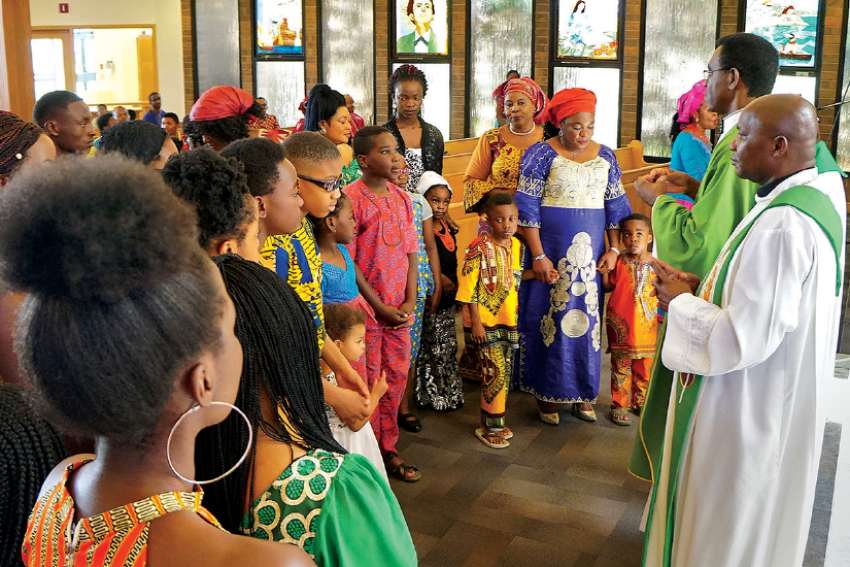He was just four years old when his family immigrated to Canada in 2009. So his chances of understanding his parents’ languages or following their traditions seemed slim. But that changed when he joined the choir for the African Mass at St. Dominic Savio Parish in north Edmonton.
“When I sing, languages come to me,” Emmanuel said. “It makes me happy.”
That’s due, in large part, to his father, Lucky Eremionkhale, president of the Nigerian African Catholic Community Association, which brought the African Mass to Edmonton two years ago.
“We want them to know how Mass is celebrated in Africa,” said Eremionkhale, who emigrated with his wife Henrietta, his son Emmanuel and daughter Blessing, now 16.
“We sing and dance, and we want them to enjoy the Mass and at the same time build bonds and develop relationships so we don’t lose them to other churches.”
Since the Second Vatican Council, the landmark gathering in the 1960s that addressed the role of the Catholic Church in the modern world, Catholics around the world have been encouraged to celebrate Mass in their native languages.
Today, the impact of that change is on full display in cities across Canada like Edmonton. Diverse ethnic and linguistic communities say their national Masses are an important part of passing on their language, culture and faith to their children born and raised in Canada.
Every Sunday in the Archdiocese of Edmonton, Mass is celebrated in at least 16 different languages including French, Spanish, Polish, Chinese, Croatian, Portuguese, Vietnamese, Italian, German, Hungarian, Korean, Latin, Sudanese, Malalyam — which is spoken in the Indian state of Kerala — and American Sign Language. In the Archdiocese of Toronto, the Mass is heard in 36 languages.
The African Mass in Edmonton is held every last Sunday of the month at St. Dominic Savio Parish. When it began in 2016, about 50 people attended. Now, up to 200 people come from parishes across Edmonton and from as far as Fort Saskatchewan.
The differences between a typical Canadian Mass and an African Mass, in particular, are stark.
An African Mass can get loud. It can run a little long. Praise and worship songs are sung in many African languages, including Igbo, Esan, Yoruba, Hausa and dialects of Zaire, now known as the Democratic Republic of the Congo. Some are sung in English, and the African Mass also retains some Latin, which is still the official language of the Catholic Church.
The clothing at Mass can be flashy, and you might even find yourself being embraced by a stranger — but Lucky Eremionkhale and the African Catholic community wouldn’t have it any other way.
“As one priest would say, people think we don’t clap in the church. We do back home,” he said. “Before you hug anybody or shake anybody here, you need to know the person. But we see ourselves like family, so somebody can hug you and shake you, even if he doesn’t know you so well.”
The joy of the African spirit is contagious, and goes beyond a simple handshake when wishing each other peace.
“They celebrate the Mass with song and celebration,” said Mona Podloski, a secretary at St. Dominic Savio Parish. “It’s all a celebration — and welcoming. Oh my goodness, you should see the ‘Peace be with you.’ Everyone stands up and hugs each other. It’s just really special. You feel really welcomed and at home, and it’s a privilege to partake in that Mass.
“Every Mass is a privilege, but to celebrate it culturally is a gift to our parish.”
Nathalie Mamgodibaye, 18, rew up in Chad, a former French colony. When she moved to the northeastern Alberta community of Cold Lake in 2013, it was quite a culture shock on many levels, including at church. She was accustomed to a choir and a packed church at Mass, and lots of drumming.
“Cold Lake doesn’t even have a choir,” she said. “The first day I thought, this is not fun.”
That changed when she moved to Edmonton in 2014 and began to attend the African Mass. Lucky Eremionkhale and others of the African community made her feel more a part of the Church and the Mass has given her a chance to wear her colourful African garments — and to remember others back home in prayer.
The faithful enjoy a potluck fellowship after Mass, with traditional food, including Nigerian pounded yam and egusi soup made of melon seeds.
Before 1965, the Mass was celebrated in Latin in every region of the world to feel the universality of the Church. Mass in many languages doesn’t destroy its unity, said Bishop Robert Kasun, Auxiliary Bishop of the Archdiocese of Toronto and a former pastor at Edmonton’s St. Clare Parish, which celebrates a Sudanese Mass.
“In fact, it highlights the universality of the Church,” said Kasun. “There is nothing more beautiful than when you are celebrating a multilingual Mass because you have all the Lord’s children from around the world gathered at the table of the Lord. That is a symbol of the great unity of the Church.”
For newcomers, celebrating Mass in a language and a culture and with music that is familiar to them gives them a better feeling of being at home, said Kasun.
“If you can’t feel at home in the church, where are they going to feel at home?”
(Grandin Media)


